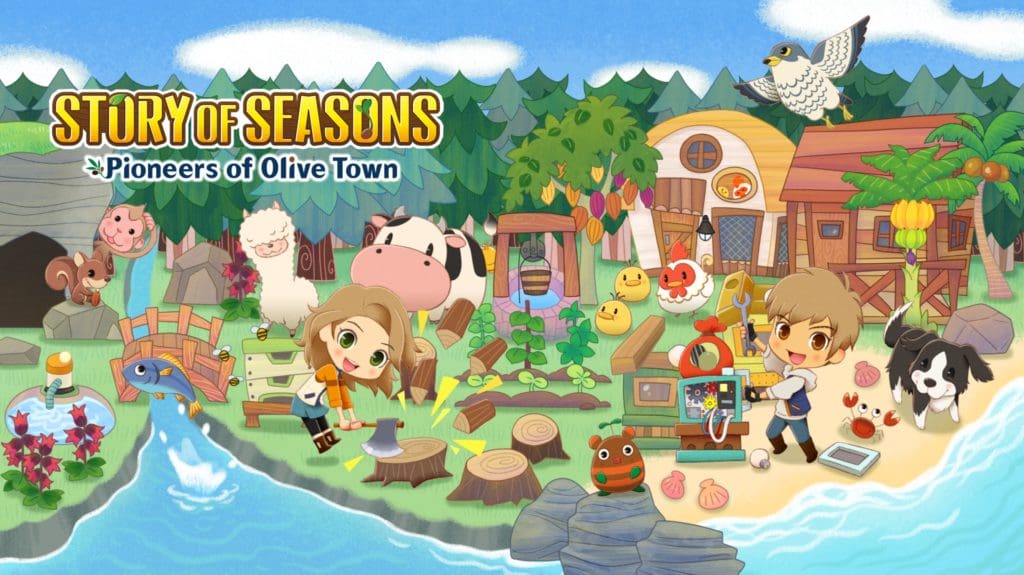STORY OF SEASONS: Pioneers of Olive Town Localization Blog #2
By Lori Snyder (Assistant Localization Lead)
Hello again, farmers! Lori here, and I’m so glad to see you back for more localization goodness in our second STORY OF SEASONS: Pioneers of Olive Town blog! We’ve finally made it to our release date, so I’ve been doing a lot of reflection on the game in general. For one thing, I can’t wait to play it again and build up another farm. You’d think translating, editing, and testing a game for 200 hours would make you feel like you “beat the game,” so to speak, but there’s still so much more I want to do!
Secondly, and probably a little more obviously, I was reflecting on the game’s localization. At the end of each of my projects, I try to make a little list for myself of things I managed to accomplish or learn more about while I was working on them. This title was no exception, and one of the things I realized I got into the nitty-gritty of was character. I’m going to jump right into this subject, because there’s a LOT I want to cover…but before I do, I’d recommend you take a gander at our first PoOT blog as well, just so you’re all caught up!
I should start this whole thing by saying that Pioneers of Olive Town has nearly 40 characters, each of them unique in their own way. From the laid-back Jacopo to the dignified retainer, Dosetsu, everyone needed their own unique way of speaking in English that would make them stick out and be…well, STORY OF SEASONS characters. And if we couldn’t convey it with words alone, we had other methods, too, which I’ll get into a bit later.
Like I mentioned in my previous blog, this series thrives on its characters. It’s the bread and butter of the game’s social features, which is why we wanted to do whatever we could as localizers to make everyone as expressive and memorable as we could while still being faithful to the original text. But where do you even start when you’ve got a cast that big? How do you organize that, and how do you prioritize character traits and speaking styles? Well, you’re about to find out!
Sowing the Seeds of Characterization
Here’s a fun fact: Bokujo Monogatari games are a great tool for beginner-level Japanese learners. You learn vocabulary for crops, animals, tools…and, of course, you’ll learn lots of greetings! Characters will always greet you in their own way or chat you up about your progress as a farmer. (Thank you, Wii-era Bokujo Monogatari games. You taught me so much…)
But anyway, back to those greetings. They’re a key part of how I started ironing out characterization for this title. How does someone say “Hello”? How polite are they? How comfortable are they speaking with the player? How do they agree or disagree with someone? I wanted to keep all of these answers somewhere so everyone on the team had access to them for consistency. But what was the best option for that? Thankfully, I found a great base in our character guide for Friends of Mineral Town. The team for that game noted helpful info for each character’s speaking style into a simple spreadsheet for everyone’s reference, with all of those previous questions answered.

A small snippet of FoMT’s character sheet, featuring Kai and Cliff’s descriptions!
I decided to take a similar approach for PoOT, and ended up with something like this:
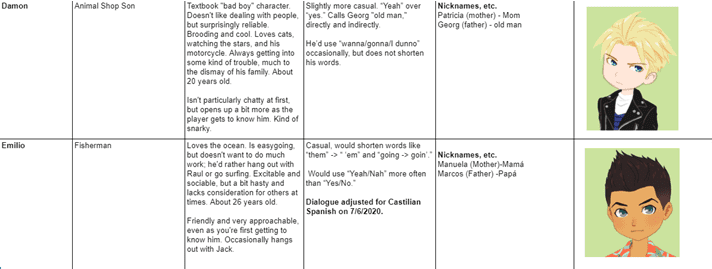
Here’s a small reference image so you can see how we formatted things. Our basic character information is listed, as well as additional notes I took when reading events and dialogue for the first time. From there, general verbal tics (if any), nicknames, and other sorts of notes were...well, noted here.
These notes are only the beginning, by the way! I would call this our character foundation—the characters were built on this for consistency between team members, but we also tried to build out from this foundation and check with the team, asking, “Does this sound like [character]?” whenever we needed feedback.
We had a lot of internal discussion as well on figuring out character voices. During our editing and proofing passes, Dani (our incredible team proofer) and I would discuss in detail the characters’ motives during events, making sure the dialogue in each event was coherent, in-character, and flowed smoothly with the context of what was going on.
But these character notes I had didn’t just come from nowhere! Aside from the in-game text, we were given documents with all sorts of cool notes on Olive Town’s residents, which was a big help when we were making our choices. This next bit is the part where you’ll probably ask, “Lori, did you think about these characters too much?” and to that I would say, “As a writer, you can never think about your characters too much. Also, I got really attached to this cast, as I tend to do with all of my projects. Oops.”
An Olive Town for Olive Us
I’ll give a few examples of my character-defining process. We’d be here all day if I dug super deep into it, so I will try to expedite things a bit:
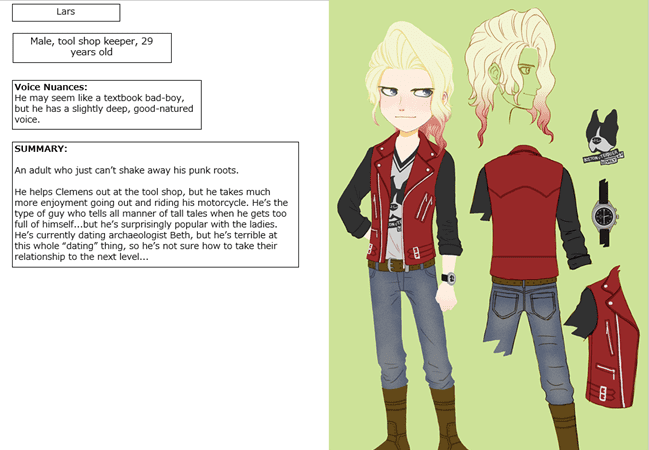
I just want to say, writing and editing for Lars was, for me, one of the highlights of the cast. Characters like him are just plain fun!
Here are Lars’ original notes. Translating his “voice nuances” had me chuckling, but I think everyone on the team really loved writing for him.
Looking at this, and considering his design, personality, and family background, here are some ideas I had:
- “He’s a tough guy who loves motorcycles, and he’s popular” – Okay, I get “confident and capable” out of this. Motorcycles are his passion! He loves talking about them and cares a lot about taking care of his own. I bet he’d refer to his motorcycle as “she,” because she’s important to him!
- “Terrible at the whole ‘dating’ thing” – Motorcycles and Beth are the loves of his life! But he’s gotta work harder conveying that to Beth! So maybe he flounders around in this department. He’s not so confident here. Maybe a bit clumsy.
After seeing his events and reading about how he interacts with the townsfolk, we came to more conclusions:
- He’s got the mannerisms of a tough guy, but he’s a jokester who’s always got his friends’ best interests in mind.
- His speech style in Japanese leans toward casual, so it made sense to do the same for him in English and lean into the “clumsy punk with a heart of gold” personality.
- He and his brother have small squabbles, but they do seem to get along decently well. I bet Lars has a nickname for him!

All of the basic info was consolidated into our Character Breakdown sheet for everyone’s reference. Not only did this help with writing our in-game events, but this also helped us when we went on to record English voices for the game.
The English voices themselves are pretty simple, and there aren’t too many for each character—somewhere between 4 and 7 lines. Some characters might respond to you with nonverbal sounds when surprised, happy, or sad. (These emotions are harder to convey without words than one would think! Who knew words could be so important?!)
But some characters, who have a more defined way of speaking, will actually greet you differently. Lars, for example, will say “Yo!” as his greeting. He’s got a lot more fun surprises to discover in his events, so be sure to talk to him every day and give him presents so you can see them all! (Here’s a hint: he likes anything with chestnuts in it!)
So, that’s one example dealing with Lars in relation to his personality and hobbies.
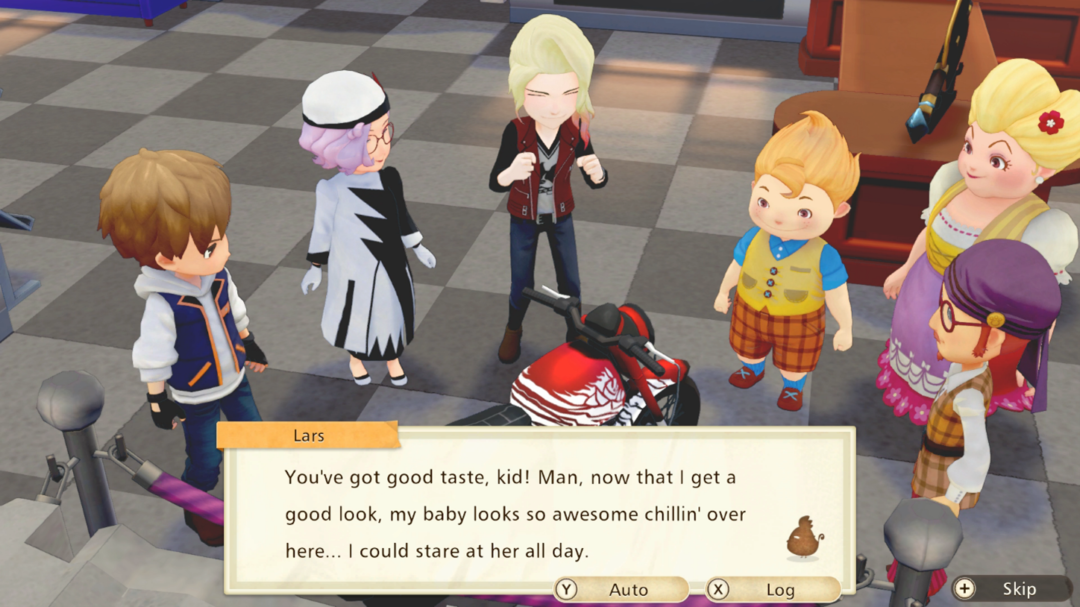
PRIMETIME SITCOM NARRATOR VOICE: “He did not, in fact, get to stare at her there all day.”
But here’s a more interesting case, whose choices in characterization relied a bit more on family background:
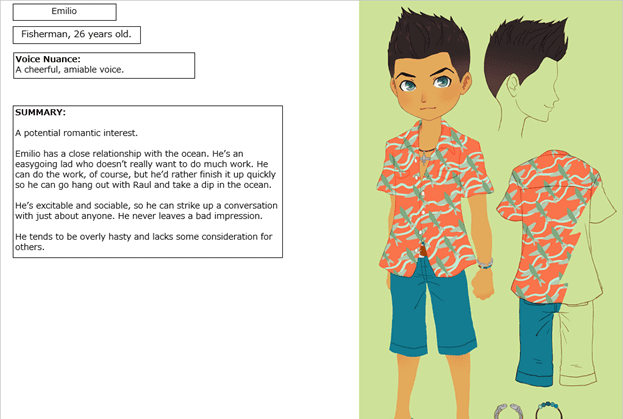
Maybe you noticed that “Dialogue edited for Castilian Spanish” note on his character breakdown sheet a few images back…?
Let’s talk about Emilio—his characterization is partially a reflection of how I wanted to convey his parents, Marcos and Manuela. Here are their notes:
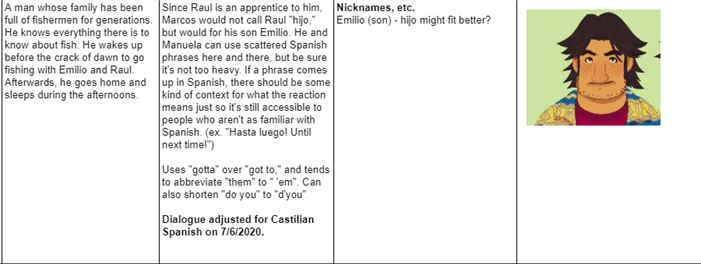
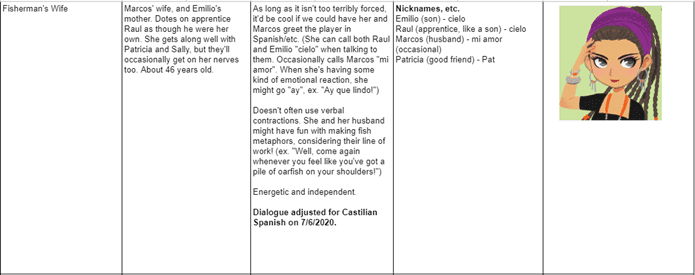
As you can see, I wanted Marcos and Manuela to speak Spanish on some level. There were several reasons for this, the first being that Olive Town itself is generally diverse. It’s a newly pioneered town, so it would naturally have people moving in from different regions and backgrounds—and maybe who even speak different languages! The game’s director, Hikaru Nakano, wanted to create a cast that was more representative of this, so I wanted to reflect those ideals into the English version in some way.
The first thing that I had to iron out was the dialect of Spanish Emilio’s family would use. Even the terms we use in the game are affected by dialect! In the end, we chose Castilian Spanish, and had everything checked by one of Marvelous’ localization producers, who is a native speaker.
So, as a second-generation son from a bilingual family, I wanted Emilio to speak Spanish to a certain extent as well, but he’s a little more hesitant with his code-switching. If you’re not familiar with the concept, it’s when you switch between two or more languages during a conversation with others who are familiar with the same language. Bilingual friends and family will often do this. I do this a lot, and wanted to explore this with our cast to a player-accessible level. I wanted there to be meaning in Emilio’s code-switching.
This is why you may not see him speaking Spanish to the player specifically. While Marcos and Manuela are pretty open about code-switching, Emilio code-switches mostly in front of his parents or Raul, who he considers family, so you may not notice it as much.
So…what happens when you marry him and become part of his family? You’ll just have to discover that for yourself!
Also, I noted it in the character breakdown sheet as well, but if you’re not familiar with Spanish, don’t worry; we left enough context when we did this so you could still understand the message. Emilio’s family isn’t the only bilingual set of characters, either, which gets me to my next point…
Karina’s Design

Karina is Olive Town’s stylist. Her general aesthetic and personality were inspired by French fashion from the 60s, so we incorporated this into her dialogue as well. She’s French bilingual, but also loves throwing in 60s slang when she can…
Do you remember how I mentioned that the project director, Hikaru Nakano, wanted to bring Olive Town a little more diversity where he could?

This was Karina’s original design, so we were pleasantly surprised to find a different Karina when we got our first build of the game to test! When asked about it, Nakano-san let us know that he and the developers wanted to make Olive Town’s residents relatable to as many players as possible, so he requested a few designs be changed to accommodate for the fact that the game would be released worldwide. Karina was only one of them!
We’re always looking out for fan feedback to each game in the series, and we love to hear your thoughts on what kinds of characters you’d want to see in future STORY OF SEASONS titles!
Make Your Way to Olive Town!
Get those motorcycles ready, folks! Now that Pioneers of Olive Town is out, you can grab a copy of the game from our store or from participating retailers! If you’re looking for a little extra farm-fresh goodness, you can’t go wrong with the physical Premium Edition. Buffy, our buffalo pocket plushie, is very much looking forward to meeting you. For farmers who just can’t wait to set foot into Olive Town, you can purchase the game digitally on the Nintendo eShop as well, either by itself or with the Game and Expansion Pass bundle. There are even more events, marriage candidates, and adventures in store for you with each expansion, so don’t miss out!
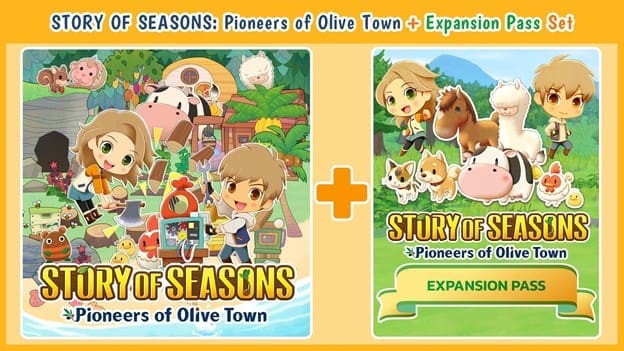
Thanks for taking the time to read our second blog, and I hope you enjoyed this little dive into some of the residents of Olive Town! Working on this game was an absolute blast, and there’s a bunch of little details to discover that I couldn’t cover in this blog, so you’re bound to come across more of them as you’re farming.
Try to find as many events as you can while you’re enjoying your new life in Olive Town! They’ll shed a little more light on the residents’ lives than a simple greeting or conversation, and there’s over 200 of them! But remember, it’s STORY OF SEASONS, so there’s no rush. Just take it easy, live your best farm life, and you’ll have lots of things to look forward to!
See you in Olive Town, everyone!

